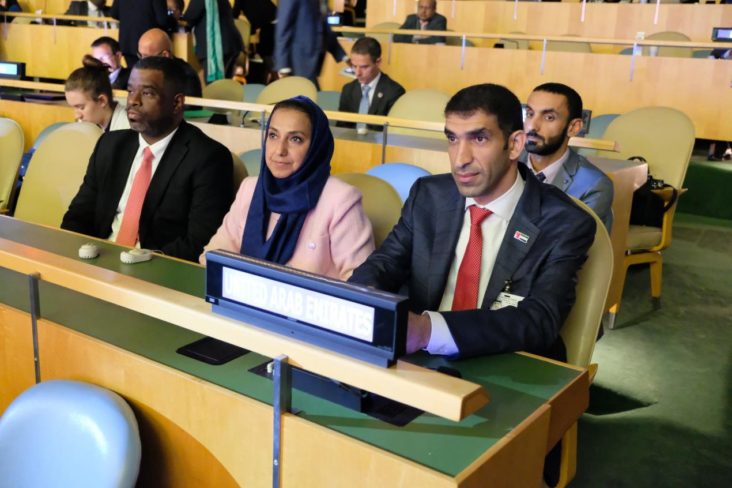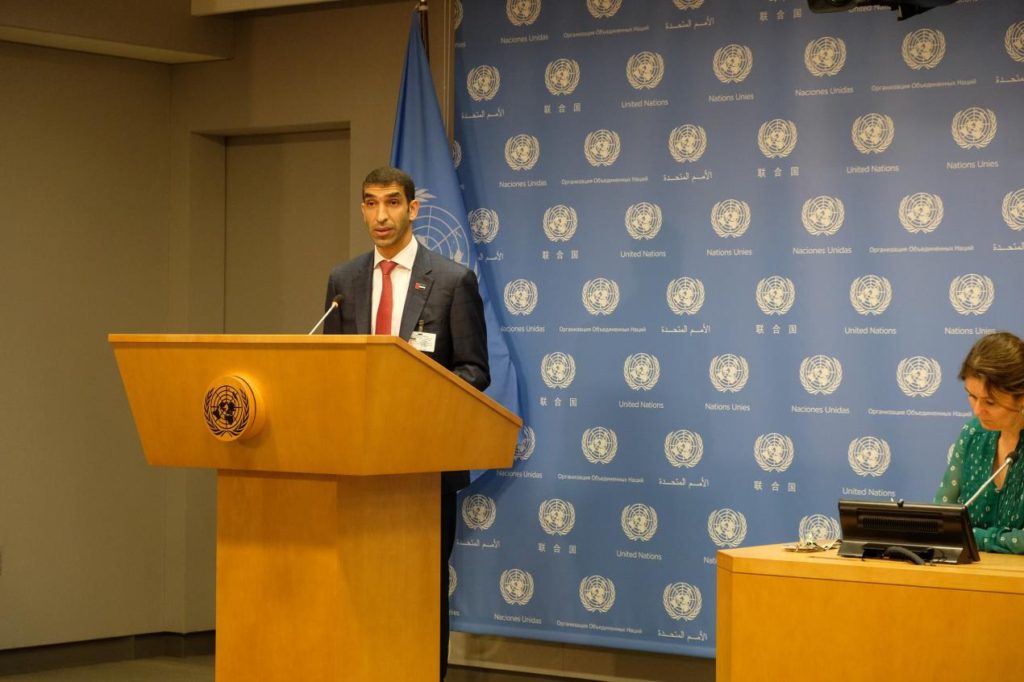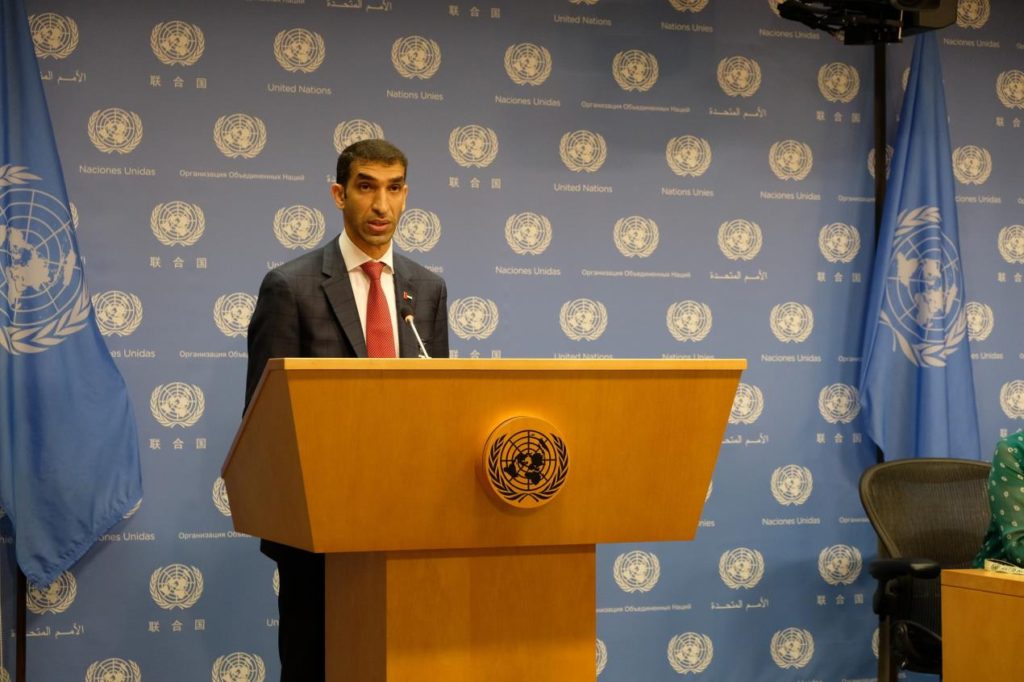UAE Minister Of Climate Change And Environment Announces Upgrades To Country’s Voluntary Nationally Determined Contributions In New York

His Excellency Dr Thani bin Ahmed Al Zeyoudi, UAE Minister of Climate Change and Environment, presented the upgrades to the UAE’s voluntary nationally determined contributions (NDCs) at a press conference on the sidelines of the UN Climate Action Summit in New York.
In his address at the briefing, organized by Luis Alfonso de Alba, the UN Secretary-General’s Special Envoy for the 2019 Climate Action Summit, His Excellency Dr Al Zeyoudi said: “Lately, we have witnessed a surge in the intensity and frequency of extreme weather events around the world. These occurrences send a strong message to the whole world to unify and step up efforts and raise ambitions and contributions. In this context, we are proud to announce the UAE’s upgraded contributions.”
His Excellency Dr Al Zeyoudi said that as part of its 2020 NDCs, the UAE will aim to achieve a target of 50 percent clean energy in its total energy mix by 2050, generated from renewable and nuclear power sources. This will more than double the existing target of 24 percent by 2021, as reflected in the country’s first NDCs. The new target builds on the world-record-setting lows for solar power costs that the UAE achieved through policy frameworks and government investments in industry capacities as well as other enabling factors. One of the first steps to meeting the 50-percent target is a commitment to building a 2 GW solar project that will outperform the existing 1 GW Noor Abu Dhabi, the largest single-site solar power plant in the world.
He added that the government-owned Abu Dhabi National Oil Company (ADNOC), one of the largest oil and gas companies in the world, will expand its first-in-the-region commercial-scale carbon capture, utilization, and sequestration project sixfold by 2030, marking one of the largest investments in this segment worldwide.
Furthermore, His Excellency Dr Al Zeyoudi noted that for the first time, the UAE’s 2020 NDCs will also include a National Climate Change Plan as well as a National Climate Change Adaptation Program. The program comprises a comprehensive governance framework to address adaptation across the energy, health, infrastructure, and environment sectors, assesses the existing and projected risks these sectors face as a result of climate change and devises relevant resilience measures.
Demonstrating the country’s holistic commitment to the environment, the Minister said: “The UAE is also leveraging cutting-edge space technologies in its latest regional efforts to join the space race. The first Arab satellite, 813, set to launch into space in 2022, will monitor desertification, drought, and greenhouse gas emissions, as well as collect vital data that can be used to pinpoint causes, symptoms, and patterns of our planet’s changing climate conditions.”
Speaking on the role of youth in shaping a sustainable future, he said: “In its fight against climate change, the UAE views youth engagement as one of the highest priorities and actively involves the young generation in climate decision-making. Young people already serve as delegates in the country’s negotiations with the UN Framework Convention on Climate Change. Through the youth council established by the Ministry of Climate Change and Environment (MOCCAE), they will now assume a formal role in authoring the 2020 NDCs.”
His Excellency Dr Al Zeyoudi added: “We plan to take multiple measures to promote youth engagement in the climate conversation. We will organize more national dialogues on climate change and facilitate exchanges between the government, youth, and civil society on climate priorities through our youth circles platform. We will mobilize other local stakeholders in the climate field, such as Dubai Electricity and Water Authority, Emirates Water and Electricity Company, and Masdar, to establish internal youth advisory councils, and include young people in the design and implementation of climate-related projects.
“We also plan to encourage the UAE’s young generation to submit policy proposals and solutions related to climate matters to MOCCAE. As for capacity building, we seek to educate young people on climate change and sustainability through our newly launched Emirates Youth Professional School, and provide them with internships with climate action stakeholders through our upcoming Youth Internships platform.”
The Minister also announced the UAE’s decision to join new coalitions that support climate action, as well as several of the initiatives announced by the summit’s own coalitions. He noted that the UAE Ministry of Infrastructure Development is participating in the Zero Carbon Buildings for All initiative that focuses on driving national ambition via enabling policies for net-zero-carbon infrastructure. He added that Empower, the Dubai government-owned central cooling systems corporation, is now a member of the Cool Coalition that aims to advance climate-friendly and efficient cooling.
As part of its sustained commitment to climate action, the UAE joined the Climate and Clean Air Coalition to Reduce Short-Lived Climate Pollutants, an alliance that aims to improve air quality and reduce the momentum of climate change. Likewise, it is now a member of the High Ambition Coalition for Nature and People that supports the call to action for protecting more of the planet, as well as the Global Commission on Adaptation that aspires to advance climate adaptation solutions.
Under the Infrastructure, Cities and Local Action Track of the UN Climate Action Summit, the UAE is committed to providing technical support and charting a comprehensive roadmap that mobilizes relevant stakeholders from local authorities and the private sector to construct net-zero-energy buildings.
Likewise, within the scope of the Social and Political Drivers Track, the country is resolved to achieving air quality that is safe for its citizens, and to aligning its climate change and air pollution policies by 2030. Under the same track, the UAE is reiterating the United Nations Educational, Scientific and Cultural Organization (UNESCO)’s global call for the protection of cultural and natural heritage from the impacts of climate change.






